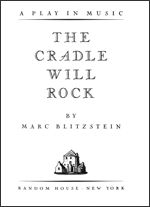Radical Novels

The Cradle Will Rock: A Play in
Music.
Mark Blitzstein.
New York: Random House, 1938.
Marc Blitzstein (1905-1964) was compared to both
Weill and Brecht, the masters of world proletarian opera, with at
least this justification: his facility enabled him to write text and
music for a series of works whose commitment to a radical overturn of
American Society was never in question. Received with enormous
enthusiasm in 1937, after drama-laden attempts at suppression, The
Cradle Will Rock takes place in Steeltown, U.S.A., where Larry,
the union organizer, confronts Mr. Mister, the unscrupulous steel
magnate who welds newspapers, citizens committees, unctuous clergy,
and obsequious professors into a front to resist the labor drive in
his plant. Brooks Atkinson wrote, "Written with extraordinary
versatility and played with enormous gusto, it is the best thing
militant labor has put in a theatre yet...What Waiting for
Lefty was to the dramatic stage, The Cradle Will Rock is
to the stage of the labor battle song...a triumph of the politically
insurgent theater."
Breezy humor, more than the often heavy satire, has resulted in a
number of revivals of The Cradle Will Rock, notably the 1947
direction of Leonard Bernstein and the memorial production of 1964.
Blitzstein's love for the proletariat led to his being in the small
number (with Leclair and Magnard) of composers who were murdered. The
event was noted only tersely in 1964, but Truman Capote supplied the
details in Music for Chameleons. The 1999 film version directed by Tim Robbins met with mixed reviews, but won awards at the Catalonian International Film Festival (2000), the Istanbul International Film Festival (2000), and the National Board of Review (1999).